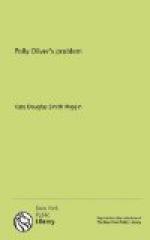“You did a kind deed, little daughter,” said Mrs. Oliver, with a kiss. “But poor Mrs. Noble! What can we do for her? We cannot play policemen all the time. We are too far from Edgar to know his plans, and any interference of which he is conscious would be worse than nothing. I cannot believe that he is far wrong yet. He certainly never appeared better; so polite and thoughtful and friendly. Well, we must let the morrow bring counsel.”
“I hope that smirking, odious Tony is disappointed!” said Polly viciously, as she turned out the gas. “I distinctly heard him tell Edgar to throw a handkerchief over my hair if we should pass any wild cattle! How I ’d like to banish him from this vicinity! Invite Edgar to dinner next week, mamma; not too soon, or he will suspect missionary work. Boys hate to be missionaried, and I ’m sure I don’t blame them. I hope he is happy downstairs in his little prison! He ought to be, if ignorance is bliss!”
CHAPTER VIII.
TWO FIRESIDE CHATS.
It was five o’clock Saturday afternoon, and Edgar Noble stood on the Olivers’ steps, Mrs. Oliver waving her hand from an upper window, and Polly standing on the stairs saying good-by.
“Come over to dinner some night, won’t you, Edgar?” she asked carelessly; “any night you like, Wednesday, Thursday, Friday.”
“Wednesday, please, as it comes first!” said Edgar roguishly. “May I help cook it?”
“You not only may, but you must. Good-by.”
Polly went upstairs, and, after washing the lunch-dishes in a reflective turn of mind which did away with part of the irksomeness of the task, went into the parlor and sat on a stool at her mother’s feet.
A soft rain had begun to fall; the fire burned brightly; the bamboo cast feathery shadows on the wall; from a house across the street came the sound of a beautiful voice singing,—
“Oh, holy night! the stars are brightly
shining.
It is the night of the dear Saviour’s
birth!”
All was peaceful and homelike; if it would only last, thought Polly.
“You are well to-night, mamacita.”
A look of repressed pain crossed Mrs. Oliver’s face as she smoothed the bright head lying in her lap. “Very comfortable, dear, and very happy; as who would not be, with such a darling comfort of a daughter? Always sunny, always helpful, these last dear weeks,—cook, housekeeper, nurse, banker, all in one, with never a complaint as one burden after another is laid on her willing shoulders.”
“Don’t, mamma!” whispered Polly, seeking desperately for her handkerchief. “I can stand scolding, but compliments always make me cry; you know they do. If Ferdinand and Isabella had told Columbus to discover my pocket instead of America, he would n’t have been as famous as he is now; there, I ’ve found it. Now, mamma, you know your whole duty is to be well, well, well, and I ’ll take care of everything else.”




